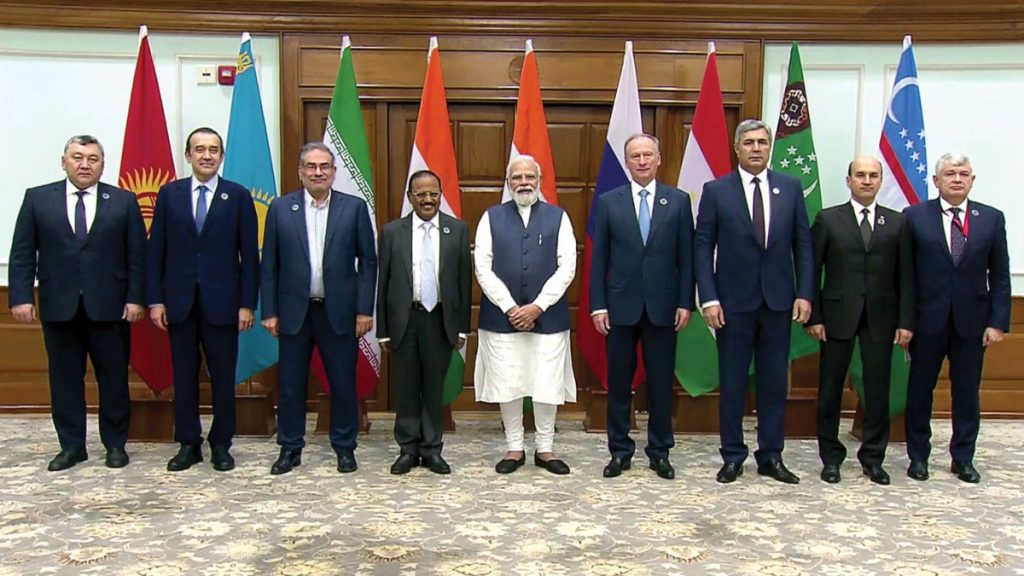Dr DK Giri
On 10 November, New Delhi sought to write a new script for the ongoing drama in Afghanistan. The attempt underscored New Delhi’s desire to secure a role in the ongoing power-play in the war-torn country. It is a moot point if the Directors of the play will allow a role to New Delhi. It will perhaps partly depend on how well the script was drafted. In all the plays enacted so far, New Delhi has had marginal roles. At any rate, the New Delhi’s exercise in the name of Third Regional Security Dialogue on Afghanistan chaired by Indian NSA provided the backdrop for New Delhi’s future role in Afghanistan.
As expected, there are various perspectives on the consultation held in New Delhi on Afghanistan. Sampling a couple, Bharat Karnad, security and political commentator, said to Al Jazeera, “The meeting in Delhi was a way of alerting everybody to India’s stake and India’s interests in Afghanistan”. He underlined the point that, this was a way of New Delhi saying, “We too have a stake and a role in Afghanistan and making that aspect clear to the world,”
The seven-country country consultation was attended by the National Security Advisers/ Secretaries of the National Security Councils of the Republic of India, the Islamic Republic of Iran, the Republic of Kazakhstan, the Kyrgyz Republic, the Russian Federation, the Republic of Tajikistan, Turkmenistan and the Republic of Uzbekistan. Unsurprisingly, the other two major stakeholders, India’s arch rivals, Pakistan and China did not participate although they were invited.
There was no participation by any representative of Taliban government in Kabul. They were not invited. Inviting them would have amounted to recognising the Taliban government, which New Delhi has not done so far. In fact, the relations between India and Afghanistan are in a suspended animation, since New Delhi evacuated its diplomatic staff from Kabul just before the US withdrew its forces. New Delhi did, however, held its first official meeting with a Taliban representative in Qatar August 31.
About the meeting in New Delhi, the Taliban government spokesman said in a rather satirical tone, “The Islamic Emirate is not worried about such meetings but hopes to facilitate good cooperation.” He assured that “the security and economic development of Afghanistan is in favour of its neighbouring countries”. We in India hope that is the case although it is hard to believe, given Taliban’s actions in the country and outside with countries like Pakistan which has been the mother of terrorism at our borders.
On the significance of the meeting, there are few points of speciality. This is the third meeting of the process; the first two editions were hosted by Iran in 2018 and 2019. But this is the first meeting of the security heads of the participating countries that India has hosted since the Taliban took over in August after dislodging the government of President Ashraf Ghani. This is also the first-of-its-kind dialogue that focused on security-related issues and is distinct from Foreign Ministry-led talks. Furthermore, this is also the highest number of countries taking part in this format.
On the deliberations in the meeting in terms of who said what; weighty, strategic statements were made by the participants. Indian NSA, Ajit Doval, said, “These (deliberations) have important implications not only for the people of Afghanistan but also for its neighbours and the region. This is a time for close consultation amongst us and greater cooperation, interaction and coordination among the regional countries”.
Sounding somewhat a discordant note, the Russian representative Nikolai P. Patrushev said multiple dialogue mechanisms “should not complicate” the unfolding situation in the Taliban controlled Afghanistan. While praising the role of various regional dialogue mechanisms that have been framed so far, in order to deal with the political situation in Afghanistan, he appeared to favour, the Moscow consultation, which had ‘broad participation’ by all sides. He was obviously alluding to participation by China, Pakistan and Taliban government.
At the end of the meeting, a joint statement called the ‘Delhi Declaration’ was issued. Thanks to the management of the meeting, the declaration was based on a consensus. The Declaration contained 12 clauses pointing to various wishes and objectives like “collective cooperation” against terrorism and drug trafficking in the region, “concern over the deteriorating socio-economic and humanitarian situation in Afghanistan”, the “need to provide urgent humanitarian assistance to the people of Afghanistan” and so on.
Given the divisions existing in the country on ethnic lines, exacerbated by the advent of Taliban into power, the Declaration emphasised that the assistance should be provided in an “unimpeded, direct and assured manner” and that the help should be distributed across the country “non-discriminatorily across all sections of the Afghan society”.
Significantly, 4 out of 12 clauses referred to terrorism, radicalisation, extremism, separatism and drug trafficking. It urged an inclusive government, underlined the critical role of the United Nations, protection of fundamental rights of women, children and minorities, the urgent need for humanitarian assistance and the inclusive manner of its distribution, assistance to fight COVID-19, and reiteration of the spirit of dialogue on Afghanistan and related issues.
By most parameters, the meeting was a success. New Delhi got in the groove on Afghanistan, but surely, it is a bit late in the day. However, since we have great stakes in Afghanistan, let us compliment the GOI with the dictum, “better late than never”.
INFA. The writer is Professor of International Politics, JIMMC.
